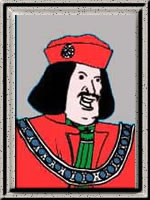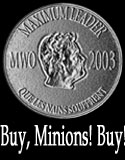The Commissar sat upright at his desk. He regarded the wide expanse of polished wood in front of him. The desk was clear except for a plain gray metal lamp, a telephone and a pad of paper. He looked up across his office. It was positively spartan. There were few file cabinets that he never opened himself. To his left a picture of the General Secretary on the wall. There was a flag in the corner behind the Commissar. Across the desk from him were two plain wooden chairs with no cushions. Beyond the chairs was a stand from which hung the Commissar√ɬĘ√Ę‚Äö¬¨√Ę‚Äě¬Ęs uniform cap. The floor was dull and bare. It was a utilitarian space, save for the desk.
The desk was magnificent. It was mahogany, elaborately carved and polished to a high sheen. The Commissar often admired his richly wooded reflection while he worked. He loved the desk. He loved it because he appreciated beautiful things, however bourgeois they may be. He appreciated the skill of the craftsman who made the desk. He found himself imagining the craftsman selecting the wood. Imagining the hours carving the flourishes in the legs, the staining, the polishing. How many hours, days or weeks did it take to make this desk? It was the Commissar√ɬĘ√Ę‚Äö¬¨√Ę‚Äě¬Ęs only indulgence in his office.
He reached out and rubbed his fingertips along the edge of the desk closest to him. Did anyone at the General Staff office know about the desk? They surely did. The provincial Governor admired it when he visited. The Commissar offered the desk to the Governor declaring that it was too opulent for the Camp and it was more suited to the Palace of the People. The Governor declined the offer. The Commissar was stone-faced and expressed his disappointment that the Governor didn√ɬĘ√Ę‚Äö¬¨√Ę‚Äě¬Ęt want the desk; but he smiled deep inside his soul glad that the Governor didn√ɬĘ√Ę‚Äö¬¨√Ę‚Äě¬Ęt agree to take the desk. The desk pleased the Commissar. The Commissar didn√ɬĘ√Ę‚Äö¬¨√Ę‚Äě¬Ęt allow himself many pleasures.
The General Staff? They didn√ɬĘ√Ę‚Äö¬¨√Ę‚Äě¬Ęt care about his desk. Did they? He√ɬĘ√Ę‚Äö¬¨√Ę‚Äě¬Ęd visited Headquarters. The offices there were positively opulent. The Commissar wondered if one day he√ɬĘ√Ę‚Äö¬¨√Ę‚Äě¬Ęd be on the General Staff and have a splendid office. Would he take this desk with him? No, he would not. He wouldn√ɬĘ√Ę‚Äö¬¨√Ę‚Äě¬Ęt want to show evidence of his attachment to any object. Attachment to possessions was a counter-revolutionary impulse. He suppressed his attachment to the desk. He thought it was likely that he would have a nicer one if he were appointed to the General Staff and would never give this desk a second thought.
He turned and looked out the window at the low buildings of the Camp. Subversives in drab uniforms were marched under guard towards the fields. Although the Camp was formally called a √ɬĘ√Ę‚Äö¬¨√Ö‚ÄúRegional Workers Re-education and Preparatory Facility√ɬĘ√Ę‚Äö¬¨√ā¬Ě there was no re-education or preparation going on in the Camp. The reactionaries and counter-revolutionaries interned in this Camp were hopeless. They could never be reintegrated into decent society. They would work or die here. In fact most would work and die here.
As the Commissar gazed absentmindedly out the window there was a sharp double rap at the office door. He immediately recognized the speed and strength of the knock as that of his ADC.
√ɬĘ√Ę‚Äö¬¨√Ö‚ÄúCome!√ɬĘ√Ę‚Äö¬¨√ā¬Ě The Commissar ordered after quickly adjusting his posture in his chair.
His ADC opened the door with his right hand. Under his left arm were nestled a stack of plain folders of various thicknesses. The small severe-looking ADC strode across the office and positioned himself directly across the desk from the Commissar.
√ɬĘ√Ę‚Äö¬¨√Ö‚ÄúToday√ɬĘ√Ę‚Äö¬¨√Ę‚Äě¬Ęs final assessments Comrade Commissar.√ɬĘ√Ę‚Äö¬¨√ā¬Ě The ADC looked the Commissar straight in the eye and waited for the slight nod from his commanding officer before placing the folders on the smooth top of the desk and gently pushing them across to the Commissar. When the folders were positioned in front of the Commissar the ADC took a backwards step and fixed his eyes on a bare patch of wall above and behind the Commissar.
The Commissar reached into his jacket pocket and withdrew a small pair of wire rimmed glasses. As he placed the glasses on his face he unlocked a side drawer of the desk and removed a small inking pad and stamp.
This was always the final administrative act of the day. His review of the √ɬĘ√Ę‚Äö¬¨√Ö‚Äúassessment√ɬĘ√Ę‚Äö¬¨√ā¬Ě folders. The Commissar and the ADC had developed this routine that was followed day in and day out without variation. The assessments weren√ɬĘ√Ę‚Äö¬¨√Ę‚Äě¬Ęt really assessments. They were the death warrants to be executed the next day. Some days there was only one folder. Other days there were as many as one hundred. The Commissar recalled that the most in a single day was three hundred thirty-four. The original number for that fateful day was three hundred and thirty-three. When he saw that number printed out the Commissar thought that the repetition of the number three was numerically disturbing. While knowing he shouldn√ɬĘ√Ę‚Äö¬¨√Ę‚Äě¬Ęt be superstitious he suggested to his ADC that he must have forgotten one file on his desk. The ADC√ɬĘ√Ę‚Äö¬¨√Ę‚Äě¬Ęs measured demeanor broke for a split second before he swiftly left the Commissar√ɬĘ√Ę‚Äö¬¨√Ę‚Äě¬Ęs office and returned a moment later with the √ɬĘ√Ę‚Äö¬¨√Ö‚Äúforgotten√ɬĘ√Ę‚Äö¬¨√ā¬Ě folder. The Commissar wasn√ɬĘ√Ę‚Äö¬¨√Ę‚Äě¬Ęt sure why he suggested that one person be added that day rather than one be postponed to the next day.
Then the Commissar realized why he always added to the list and never subtracted. He didn√ɬĘ√Ę‚Äö¬¨√Ę‚Äě¬Ęt want to seem as though he wasn√ɬĘ√Ę‚Äö¬¨√Ę‚Äě¬Ęt zealously exercising the will of the Party.
The Commissar placed the inking pad and stamp on the desk to the right of the folders. While he did this he visually counted the folders. Fifteen today. Most of the folders were rather thin. He carefully opened the first folder with his left hand and saw the summary sheet. The summary sheet was neatly typed and smelled faintly of glue. He noticed that some of the glue affixing the photo to the upper left corner of the sheet had protruded from the side of the photo and was congealed on the paper. In another day that little node of glue would cause the summary sheet to stick to the inside of the folder.
The Commissar thought for a moment that he might use his fingernail to remove the excess glue. Then he thought better of it. He never actually touched any of the pages inside the folder. He only handled the folders themselves. In these cases the folders were temporary vessels. The paperwork would be left in the folders for a few days. After a few days the paperwork would be removed from the folder, bound together, then stacked in a plain brown box and put into long-term storage. The folder would get reused.
This rather odd office procedure was ordered by the ADC to the rest of the Administrative Staff. The idea of this procedure did not come to the ADC on his own. He developed the process after a conversation with the Commissar. The Commissar noted that there wasn√ɬĘ√Ę‚Äö¬¨√Ę‚Äě¬Ęt any need to waste folders on these reports when they were just going to sit in boxes. The ADC in an effort to conserve office resources determined that not only should the folders be reused but that the thinnest and cheapest paper be used for the assessment reports.
The ADC√ɬĘ√Ę‚Äö¬¨√Ę‚Äě¬Ęs vigorous pursuit of cost-savings and efficiency pleased the Commissar when he learned of it. The Commissar mused to himself, on more than one occasion, if the ADC had ever tried to understand what might have motivated the request. It was doubtful that the ADC ever had. The Commissar√ɬĘ√Ę‚Äö¬¨√Ę‚Äě¬Ęs request, insofar as the ADC was concerned, was just another way the Commissar was conscientious in doing the business of the Party.
The Commissar glanced over the first summary sheet and then took the stamp in his right hand. In a well-repeated motion the Commissar ever so slightly tapped the stamp to the ink and then lightly stamped the box at the lower right of the summary sheet. The stamp touched the paper with just enough pressure for the stamp image to lightly show on the paper without the ink penetrating to the page below. With the tips of the fingers of this left hand the Commissar closed the folder and slid it off the pile and across the desk towards the ADC, who immediately picked up the folder from the desk and waited for the next.
The Commissar repeated this process fourteen more times.
When he had all the folders in hand the ADC thanked the Commissar and withdrew.
The Commissar replaced the stamp and pad in the drawer and locked the desk, removed the glasses from his face, and sat back in his chair.
He alternately smiled and grimaced to himself at the thought of what he√ɬĘ√Ę‚Äö¬¨√Ę‚Äě¬Ęd just done and the pathetic process he had implemented to salve his infrequent guilt. He√ɬĘ√Ę‚Äö¬¨√Ę‚Äě¬Ęd stopped signing the death warrants only a week into his command here. He√ɬĘ√Ę‚Äö¬¨√Ę‚Äě¬Ęd suggested to the ADC that a stamp with the words √ɬĘ√Ę‚Äö¬¨√Ö‚ÄúBy order of the Commander, Region 58 Workers Re-education and Preparatory Facility√ɬĘ√Ę‚Äö¬¨√ā¬Ě would be sufficient to fulfill the final administrative step in the gruesome path to death for so many. The Commissar would not have kept the meticulous records if he√ɬĘ√Ę‚Äö¬¨√Ę‚Äě¬Ęd not known that the Party, for reasons passing his understanding, wanted to keep meticulous records of every subversive dispatched in the name of the people.
The Commissar was an educated man and he√ɬĘ√Ę‚Äö¬¨√Ę‚Äě¬Ęd realized the remote possibility, very remote possibility, that the People√ɬĘ√Ę‚Äö¬¨√Ę‚Äě¬Ęs Revolution might one day be overthrown by some other Order. That Order might want to punish those instruments of the Revolution who survived. The Commissar thought himself a survivor and took some precautions against a highly conjectural future where he wasn√ɬĘ√Ę‚Äö¬¨√Ę‚Äě¬Ęt at the top of the ruling class. This process with the folders was one of those precautions. No signatures. Stamps could be used by anyone. No fingerprints. He never touched the reports. Reports typed on cheap paper that would yellow, fade and deteriorate in time.
These steps might not actually help him if the time ever came. Then again, they couldn√ɬĘ√Ę‚Äö¬¨√Ę‚Äě¬Ęt hurt.
The Commissar sighed and pushed back his chair from the desk. He stood and straightened his uniform. He brushed invisible detritus from himself and his reflection in the polished desktop caught his eye. He admired the beauty of the desk again and smiled in self-satisfaction of possessing it.
The Commissar walked across his office, placed his cap on his head, opened the door and exited the office. He walked out of the Administration building acknowledging only his ADC and the guards at the main entrance with a short half salute.
The Commissar walked towards his quarters and was given a wide berth by all in his general vicinity. Not once did Commissar think about his duties on the walk. He took in the warm sun, green grass, full trees and fresh air. They were beautiful and he appreciated beautiful things.


